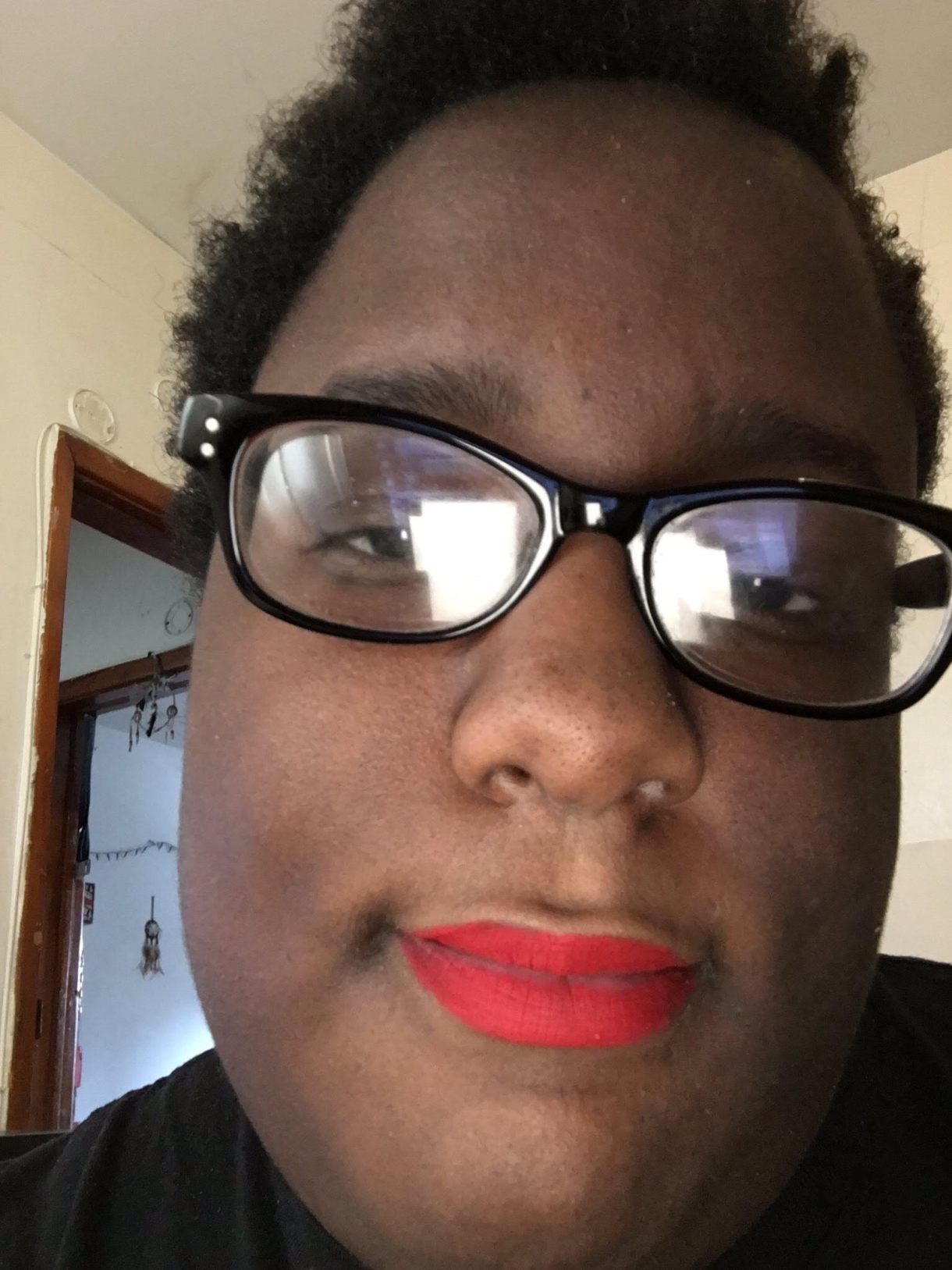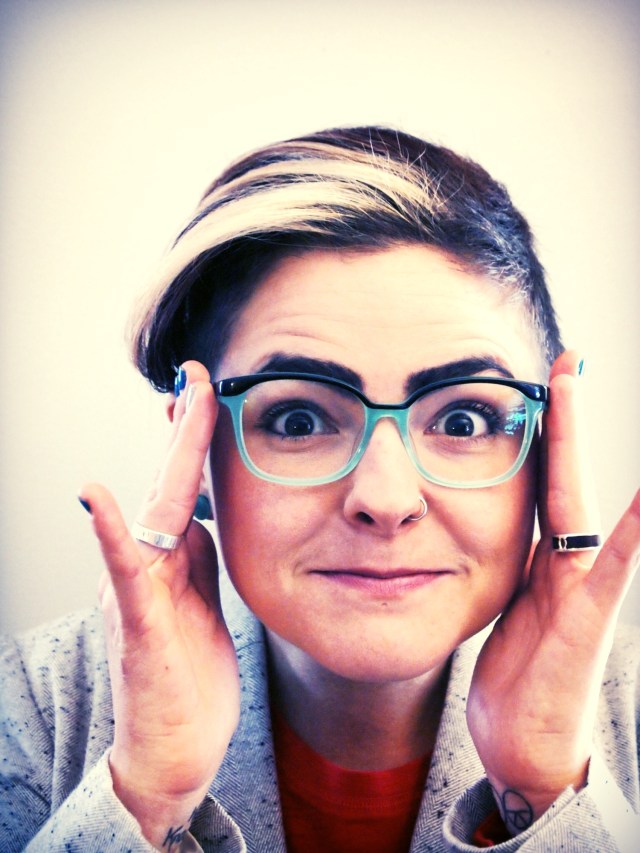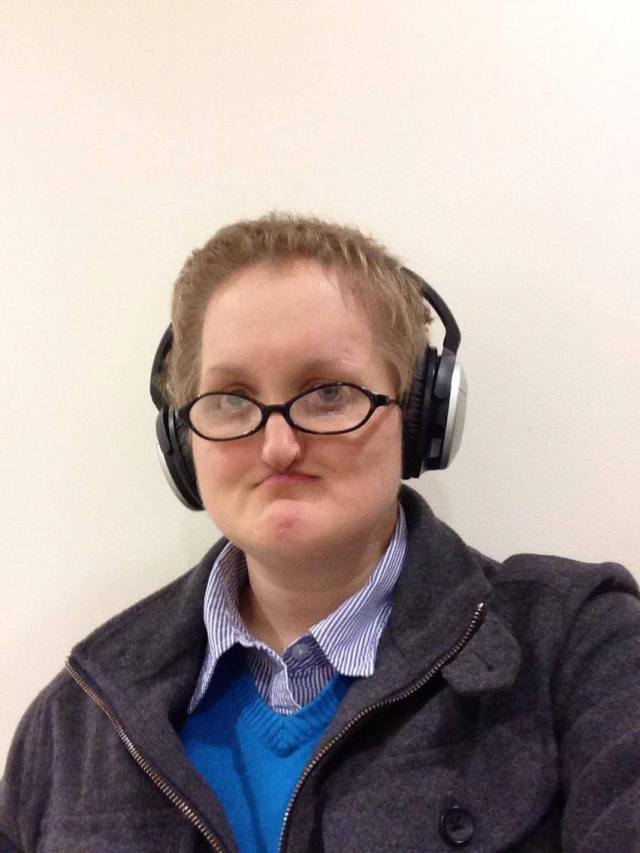Karin / 40 / Midwest / Editor and blogger
I require several hours of personal care assistant services per day to get out of bed, shower, dress, and cook. With the Medicaid waiver program in my state, I can hire people of my choice to care for me, and feel safe in my home knowing they accept my sexual orientation (I identify as a lesbian) and political views.
The Medicaid Working Disabled program is my only option to pay for my assistants. No private insurance, including Obamacare, covers in-home care. Without Medicaid, my care would cost about $4000 per month, far more than my income. AHCA would cut Medicaid funding by billions, putting my care in jeopardy. The AHCA could force me to choose between my job and being able to get out of bed in the morning. It could even force me into a nursing home, which to me would be a fate worse than death.
Angel / 24 / Buffalo, NY / Writer

I don’t know the exact impact, but I can see myself not being able to live on my own anymore; my parent is also disabled so it would be difficult. I couldn’t get pca services, adaptive equipment (like a new wheelchair when necessary) or even the medicine I take for major depression and much more of the essential things I need to function in life. It’s scary.
“Why is it that because we don’t have the same opportunities and are more obstacles placed in our way, we have to be punished?”
Why is it that only people with money get to not worry about their health? Life is expensive and just because some of us require more expenses doesn’t mean our lives aren’t equally valuable. Money shouldn’t matter when it comes to access quality healthcare, but it does. So why is it that because we don’t have the same opportunities and there are more obstacles placed in our way, we have to be punished?
Sara / 28 / El Cerrito, CA / Nonprofit admin
I’m lucky enough to currently have insurance coverage through my workplace, but even that is not guaranteed under the AHCA. As a person with mental illness and a physical disability since birth, I have multiple preexisting conditions, and I would almost certainly be rejected from any private plan. I currently love my job, but the AHCA would force me to stay here even if that changes. I wouldn’t ever be able to start my own business or work at a job that doesn’t offer health insurance. Even if I do everything right, I can still end up without health insurance, and that thought terrifies me.
Mostly, though, I’m worried about the access of those of us who don’t have employer-sponsored health insurance. There aren’t enough full-time jobs for all of us already — so many people I know are stringing together multiple part-time jobs just to survive. Do you really want us to be uninsured?
Lark / 30 / Ypsilanti, MI / Nutritional therapist and owner of Transformative Wellness

I don’t know what will happen to me under the AHCA. I’ve read about the implications, but I can’t really bring myself to imagine what will happen before the bill is in its final form. It’s too terrifying. My partner and I are both self-employed, so we get our insurance through the marketplace. We both have preexisting conditions (I have several). I honestly can’t really think about what will happen without having a panic attack.
I get so emotional when I try to talk about it that my thoughts become word salad. I’ve left a bunch of voicemails for Paul Ryan where I end up just sobbing into the phone. I guess the points I would try to make is that my partner is only alive right now because of the ACA, that healthcare is a basic human right, and that the AHCA will kill people and the blood will be on their hands.
Emily / 23 / Arlington, VA / Social worker

I have Type I diabetes and under the ACA, I already had a really difficult time affording my insulin, insulin pump, and supplies. I’m able to be a social worker because my job has really good benefits, but if the AHCA becomes law, there’s a good chance I’ll be excluded from even my work’s insurance. It would make it ridiculously hard to change jobs for fear of losing insurance coverage and the prices would shoot up as well. It’s a harsh reality that I will be priced out of my own life at this point if the AHCA gets passed and, quite frankly, I’m not done living my damn life yet.
I’ve often thought about mailing a box of ashes to Paul Ryan and other Senators as a visual representation of my death on their hands if this vote is passed. I would probably say something to a similar extent to someone debating their vote. I would ask them what they would do if they had Type I diabetes and could not afford health insurance to keep them alive, and explain how the AHCA will eventually kill me if they vote to make it law.
Shain / 29 / Albany, NY / Attorney and social justice activist

If the AHCA passes, I may have to limit where I can live to a state that provides universal healthcare or that restricts insurance companies from limiting or charging more. Alternately, it could (further) limit my career options by ensuring that I stay in jobs based on my access to healthcare coverage rather than my passion or professional growth. At worst, if I lost my job while living in a state that hasn’t yet put in place protections for people with preexisting conditions, I could find myself priced out of the insurance market, or at least out of coverage that would actually allow me to access the treatment I need. This would likely mean I’d have to move, because at very least I need my medications to (among other things) prevent seizures, maintain a functioning metabolism, and prevent severe depression.
“Healthcare is a human right, and if we believe that we can’t go on treating it as being contingent on behavior.”
Opponents of the AHCA shouldn’t fall into the divide-and-conquer mentality of holding up people whose conditions aren’t their fault while (even if only implicitly) throwing others under the bus. This gives ground to people who have no intention of compromising at the expense of people who deserve healthcare just as much as anyone else by virtue of being a person — regardless of their eating, drinking, smoking or exercise habits. Healthcare is a human right, and if we believe that we can’t go on treating it as being contingent on behavior.
Charlie / 28 / Illinois / Student
I don’t think I would be able to afford treatment any longer, let alone insurance. Right now, I can *just* afford my insurance premium and co-pays. Even still, it’s a negotiation between my wife and I in terms of which illnesses and treatment are a priority and those we can put off for a bit (which, alone, is a privilege to be able to do). I’m afraid of what will happen if we are unable to afford insurance — let alone treatment for our disabilities.
“Having a preexisting condition does not mean I am a lesser person than someone who doesn’t.”
Having a preexisting condition does not mean I am a lesser person than someone who doesn’t. It doesn’t mean that I’ve just made poor choices and deserve to pay more (or forego access altogether) just because I have “more” healthcare needs than some other people.
Alysia / 46 / New York / Novelist
I’m physically disabled, and I have MS and Type I (juvenile) diabetes. I had to stop teaching this year due to disability, and worry that if I need more home care (I already get monthly infusions by IV), Medicaid won’t be available to me. I’m worried that new problems might not be covered. My wife is stuck in her job because if we change health insurance they could refuse to cover me. We’re already paying several thousand dollars per year for meds and treatment, and expect to now pay more.
Krissy / 35 / Bay Area, CA / Artist, writer, gardener, and homeschooling parent

The lack of limits on co-pays is going to hurt me badly. I max out my insurance every year by June. With insurance I pay upwards of $1,000 out of pocket each month even after I hit my deductible. It’s worse for the first half of the year.
I am terrified that we are going to end up losing our security because my health care costs are going to go up.
I am one of the more privileged people in this discussion. I currently have the best health care I’ve ever had in my life because of my spouse’s work plan. We are doing very well — we are stable financially even though we currently spend more on health care for me than I made in a year up through when I turned 30. I am terrified that we are going to end up losing our security because my health care costs are going to go up.
Diana / 32 / Chicago, IL / Nonprofit fundraiser
Disability is not always a chronic health condition. Disability doesn’t always equate to poor health.
After dedicating my life to working in the nonprofit sector, my health converge is in question, my job is in question and I don’t know if I will be able to afford coverage offered within the “high risk pools.” A pretty horrible feeling for someone who doesn’t use my insurance any differently than the general population.
There are a lot of really compelling stories out there about people that need large amounts of care which does cost a lot of money. There are also a lot more people who will simply lose out because of a label and a narrative that equates pre-existing conditions with poor health status. I am disabled. I am healthy. You don’t need to fix me, or discriminate against me.
Michelle / 26 / Iowa / Engineer and writer
I have Bipolar II disorder and the medication I take daily is what allows me to function in society. Without my medication the likelihood of me being able to maintain my career and interpersonal relationships would drop significantly. The AHCA would allow my insurance to stop covering my psychiatrist appointments, therapy, and medications. My medications would cost about $500 a month without coverage. It’s not fiscally possible for me to maintain my health without that coverage.
At this point the only way I can think of having any effect would be to try and have the Senate see it from my point of view. What if their loved one were in my shoes?
Maggie / 19 / Philadelphia, PA / Student, intern, life enthusiast

I have to get my own health insurance in a few years when no longer covered by my parents’ and it’s terrifying to think about high premiums, copays, and deductibles. For me, insurance isn’t covering the risk that I might need medical care; I know I’ll need it to stay healthy and alive. That’s a 100% probability that I will need to shell out insane amounts of cash that I have no idea if I’ll have. The AHCA won’t directly affect me right now, but I’m worried it might in the future and about all of the people it will affect right now.
I really like living. The AHCA will possibly make that really hard for me.
For more on the AHCA’s potential impact on disabled communities, visit the hashtag #IAmAPreexistingCondition, read this breakdown from the ACLU, and watch this video from Rooted in Rights.
Pages: 1 2 3See entire article on one page



(202) 224-3121 <——- Senate switchboard number. Call today, call every day.
INDEED
I’m dying that I was mentioned in the same space as Leah.
Thank you, Carrie, for talking to so many people and putting this together. Really, thanks to everyone who spoke up here! Y’all are wonderful <3
Fuck. This struck a chord. I’m terrified.
Thank you to everyone for sharing their stories– you are all amazing. I hope we can get through this together.
Thank you all for sharing your stories.
Great article; emailing my senators now.
Here’s senator contact info by state:
https://www.dailykos.com/stories/2017/6/12/1671161/-Republican-senators-say-their-phones-aren-t-ringing-to-save-the-ACA-so-here-s-the-contact-list